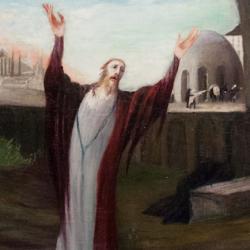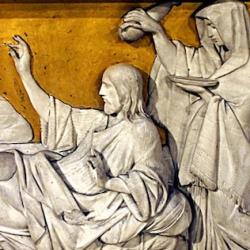INTRODUCTION
The three parables in Jesus’ Olivet Discourse all emphasize that Jesus assesses His disciples according to their performance. The judgment scene at the end of Matthew 25 makes the same point: The ones who enter life are the ones who have acted righteously toward the least of Jesus’ brothers.
THE TEXT
“When the Son of Man comes in His glory, and all the holy [ c ] angels with Him, then He will sit on the throne of His glory. All the nations will be gathered before Him, and He will separate them one from another, as a shepherd divides his sheep from the goats . . . .” (Matthew 25:31-46).
WHEN THE SON OF MAN COMES
As with the parables, we have to ask the question of timing: When does Jesus say this judgment will take place? It will happen when the Son of Man comes in glory with His angels (v. 31). Jesus has used almost this same phrase earlier in Matthew, when He warned that the Son of Man would come to “recompense every many according to His deeds” ( 16:27 ). In that earlier passage, Jesus says that some of the disciples would live to see it ( 16:28 ). The judgment scene in Matthew 25 takes place at the end of the Old Covenant.
THE NATIONS
The Olivet Discourse progresses from the judgment on Jerusalem (24:1-35) to a warning about Jesus’ assessment of His own disciples (24:36-25:30) to a judgment on the nations (25:31-46). Before the end comes, the gospel will be preached to the entire oikoumene (24:14), and the nations will be judged according to their treatment of Jesus’ “brothers” (25:40, 45). Jesus earlier sent out the Twelve, and judged the cities of Samaria and Galilee based on their treatment of the missionaries (10:1-15; 11:20 -24). When the gospel moves to the Roman empire , the nations will be judged in the same way. In the first instance, the nations will be judged according to whether they received the traveling missionaries sent by Jesus (cf. 10:42 ).
JESUS AND THE OUTCASTS
More deeply, it is clear in this passage that Jesus identifies Himself with the hungry, thirsty, naked, sick, imprisoned, and strangers. Jesus spent much of His ministry associating with outcasts, tax gatherers and sinners ( 9:10 -11; 11:19 ), feeding the hungry ( 15:32 ), calling prostitutes to repent ( 21:13 ), encouraging generosity to the poor ( 19:21 ), rescuing the helpless. Jesus focused His ministry on bringing the good news to the poor (11:5; cf. Luke 4:18 ), and He identifies Himself with them. Treatment of the needy is thus the basis for the judgment of the nations.
TYPOLOGY
The end of the old covenant foreshadows the end of the new, just as Old Testament prophecies are frequently fulfilled in Jesus’ ministry and more fully later. It’s not surprising that the New Testament teaches that a final judgment will take place after the millennium ( 19:11 -12), and that final judgment will also be a judgment “according to their deeds” (Revelation 19:12 ). Our entry to life or death will be determined by how we treat Jesus, and His brothers.











